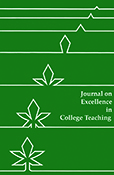Feb 23, 2015
Journal on Excellence in College Teaching

admin
Duke now subscribes to the Journal on Excellence in College Teaching! You can easily access full text of the journal from on campus or off — from the Duke Libraries homepage, click Online Journal Titles, and enter the title of the journal. Thanks to Emily Daly, our […]
 Duke now subscribes to the Journal on Excellence in College Teaching! You can easily access full text of the journal from on campus or off — from the Duke Libraries homepage, click Online Journal Titles, and enter the title of the journal. Thanks to Emily Daly, our librarian for education and the head of assessment and user experience at Duke University Libraries, for adding this title to the many education journals already available to Duke faculty, staff and students.
Duke now subscribes to the Journal on Excellence in College Teaching! You can easily access full text of the journal from on campus or off — from the Duke Libraries homepage, click Online Journal Titles, and enter the title of the journal. Thanks to Emily Daly, our librarian for education and the head of assessment and user experience at Duke University Libraries, for adding this title to the many education journals already available to Duke faculty, staff and students.
In the current issue (volume 26, number 1), Adam Persky at UNC-CH compared student preference for reading versus an animation to prepare for a flipped classroom. In the flipped classroom model of teaching, students prepare with basic materials before class, and apply this material with the guidance of the instructor during the class. Students were given learning objectives to prepare for class, and offered a book or animated, narrated multimedia modules. At the end of the semester, students were asked which format they preferred. Although students used both resources, the majority preferred the reading material for pre-class preparation! Read more: Qualitative Analysis of Animation Versus Reading for Pre-Class Preparation in a “Flipped” Classroom (PDF for Duke affiliates).
Also in the current issue, Pedagogical Perspectives for the Online Education Skeptic (PDF) addresses the divide between faculty skeptical of online education and university administrators who see it as part of a long term strategy. They analyzed the current literature to suggest five foundational concepts in online education. The first is that effective online education is not an attempt to replicate a face-to-face classroom. Online education is different from traditional face-to-face classes, offering alternate ways of learning, some of which may be more effective than face-to-face classrooms. This insight, and the remaining four, provide ways of thinking about online learning that will help improve online courses, and provide a basis for more fruitful discussions about online and face-to-face education.
The previous issue (volume 25, numbers 3 and 4) focused on small-group learning in higher education: Cooperative, Collaborative, Problem-based and Team-based Learning, a wonderful resource for anyone interested in flipping their class or providing students with opportunities to learn and practice higher order thinking skills using small groups in the classroom. The final article in this issue is an analysis of the team-based learning literature, concluding that there is growing empirical evidence for the effectiveness of this method in terms of knowledge acquisition, participation and engagement, while identifying some factors that challenge learners and teachers in adapting this method.
I look forward to referring faculty to these peer-reviewed research articles to help them plan their courses for increased student engagement and learning.